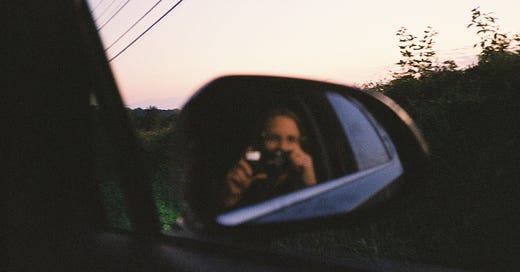One night a few years ago, about an hour after falling asleep, I woke up very shaken.
There was a dream, I think.
It didn’t feel like a dream. It felt real. Devastatingly real.
I was both witness and participant.
My perspective wasn’t first-person — I observed the events of the dream at a bit of a distance— but the intensity of my despair over the situation was beyond empathic.
Two people had just woken up from a deep slumber. Their eyes wide, I perceived their confusion. They looked around, dazed. Either they had been put under intentionally, or had been rendered unconscious by some event. I don’t know. The sense I had was they had been “frozen.” Now they were unfrozen.
When they woke, however, everyone and everything they had ever known was gone. Long gone. Obliterated. There were just the two. One young man. One young woman. Nothing else. No one.
Further, the atmosphere of the planet had been changed since the time they knew and they could no longer speak. I somehow knew all of this just from the looks on their faces.
My heart recognized some small consolation in their having each other, in their not being totally alone. But it didn’t feel like much when I understood they wouldn’t be able to communicate.
The landscape was barren. The air was thick with the dust of desolation. The two were naked, stripped of all that had ever clothed them.
* * *
When I woke in my darkened bedroom I was overcome by such heartache, fear, and dread that I forced myself out of bed in order to feel the ground beneath my feet. I walked to the bathroom and turned on the light to gaze at myself in the mirror, to remind myself of my own reality, of my (I hoped) identity.
I found myself wishing for the forgetfulness that comes when we wake.
The forgetfulness, however, took its time.
During this stretch, I continued to struggle with what felt like the anguish of loss. So entangled I felt with these two young adults and their loss that I suddenly wanted all of my loved ones near me. I wanted to embrace them. No, I wanted to cling to them, hold them close to me, imbibe their very essence.
It felt like agony to be apart from them. It felt like grief.
I let myself lay back down, but my mind raced. What was I doing, all day, every day, concerned with mundane activities and agitations? Why hadn’t I spent more time with them today, my beloveds, or yesterday? Or the day before? Why did I let myself get annoyed by the little things? Why did I waste so much energy and attention on traffic jams, on bad drivers, on unfriendly neighbors?
The morning couldn’t come fast enough. I wanted them all back. I wanted more time. I longed to try again, to do better.
Is this what death feels like? I wondered. Or dying?
Slowly, however, I began to forget. Slowly, the dream experience dissolved and my waking experience became more concrete. The sun rose. The alarm went off. I reminded myself that nothing dire had actually happened in my waking life. I reminded myself that most likely the sun would again rise tomorrow, our atmosphere would be intact, and I would once again be presented with an opportunity to be engaged with and attentive to my children, to be kind and loving to my mother, to be available to friends who reached out to me for conversation.
I found myself grateful for forgetfulness, for the neurological function (if that’s what it is) that prohibits us from living too long in two different realities — dreams and waking. I said a little prayer for the one who graces us with the gift of forgetfulness, even if the consequence is that we forget our pleasures and our joyfulness, too.
* * *
My dream teacher has taught me that there is no such thing as a nightmare. There are only dreams, and the healing we can access if we work at distinguishing between feeling and reactivity in our dreams. The fear, the terror, the anguish we meet in dreams is sacred, too.
It’s through this lens that I am grateful both for the dream, and for the forgetting of the dream, which as you can see I haven’t fully forgotten.
It’s with me just enough to remember, just enough for me to consider how I might show up differently in the world today. How I may love my life and my loved ones with a little bit more care, knowing that it could all be obliterated in the blink of a dreaming eye.




Why is it sometimes easy, sometimes difficult to remember dreams? Do they influence our days ev3n if we son't remember them?
Dreams are a large and important part of my life, I’m so glad to have found your writing and can’t wait to dive into more!